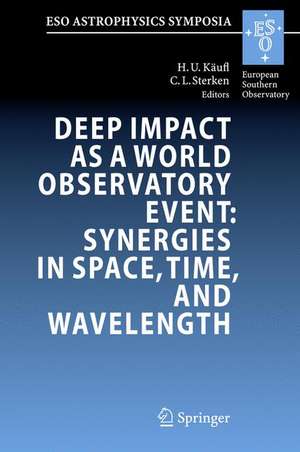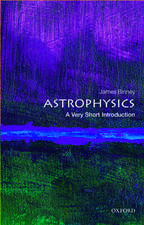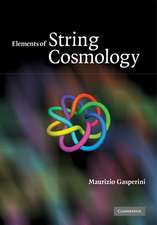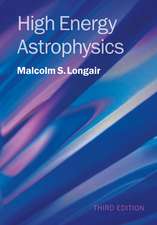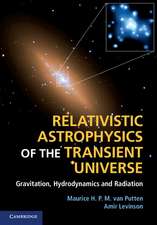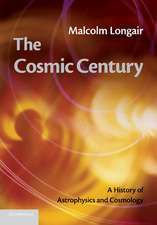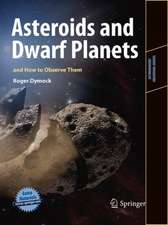Deep Impact as a World Observatory Event: Synergies in Space, Time, and Wavelength: Proceedings of the ESO/VUB Conference held in Brussels, Belgium, 7-10 August 2006: ESO Astrophysics Symposia
Editat de Hans Ulrich Käufl, Christiaan Sterkenen Limba Engleză Hardback – 22 oct 2008
This book includes the proceedings of a meeting that brought together an audience of theoreticians and observers - across the electromagnetic spectrum and from different sites and projects - to make full use of the massive ground-based observing data set. The coherent presentation of all data sets illustrates and examines the various observational constraints on modelling the cometary nucleus, cometary gas, cometary plasma, cometary dust, and the comet's surface and its activity.
| Toate formatele și edițiile | Preț | Express |
|---|---|---|
| Paperback (1) | 565.64 lei 38-44 zile | |
| Springer Berlin, Heidelberg – 25 noi 2010 | 565.64 lei 38-44 zile | |
| Hardback (1) | 647.27 lei 6-8 săpt. | |
| Springer Berlin, Heidelberg – 22 oct 2008 | 647.27 lei 6-8 săpt. |
Din seria ESO Astrophysics Symposia
- 15%
 Preț: 656.43 lei
Preț: 656.43 lei - 15%
 Preț: 656.10 lei
Preț: 656.10 lei -
 Preț: 369.78 lei
Preț: 369.78 lei -
 Preț: 404.51 lei
Preț: 404.51 lei - 15%
 Preț: 644.95 lei
Preț: 644.95 lei - 15%
 Preț: 656.43 lei
Preț: 656.43 lei -
 Preț: 391.97 lei
Preț: 391.97 lei - 18%
 Preț: 971.01 lei
Preț: 971.01 lei -
 Preț: 434.94 lei
Preț: 434.94 lei - 15%
 Preț: 650.86 lei
Preț: 650.86 lei -
 Preț: 402.98 lei
Preț: 402.98 lei -
 Preț: 403.90 lei
Preț: 403.90 lei -
 Preț: 412.78 lei
Preț: 412.78 lei - 15%
 Preț: 645.47 lei
Preț: 645.47 lei -
 Preț: 431.30 lei
Preț: 431.30 lei - 15%
 Preț: 649.06 lei
Preț: 649.06 lei -
 Preț: 402.56 lei
Preț: 402.56 lei -
 Preț: 413.15 lei
Preț: 413.15 lei -
 Preț: 409.30 lei
Preț: 409.30 lei -
 Preț: 430.10 lei
Preț: 430.10 lei -
 Preț: 406.42 lei
Preț: 406.42 lei - 15%
 Preț: 658.05 lei
Preț: 658.05 lei - 20%
 Preț: 590.38 lei
Preț: 590.38 lei -
 Preț: 400.65 lei
Preț: 400.65 lei -
 Preț: 413.15 lei
Preț: 413.15 lei - 15%
 Preț: 658.70 lei
Preț: 658.70 lei -
 Preț: 401.79 lei
Preț: 401.79 lei -
 Preț: 436.70 lei
Preț: 436.70 lei -
 Preț: 404.13 lei
Preț: 404.13 lei
Preț: 647.27 lei
Preț vechi: 761.49 lei
-15% Nou
Puncte Express: 971
Preț estimativ în valută:
123.87€ • 128.85$ • 102.26£
123.87€ • 128.85$ • 102.26£
Carte tipărită la comandă
Livrare economică 14-28 aprilie
Preluare comenzi: 021 569.72.76
Specificații
ISBN-13: 9783540769583
ISBN-10: 3540769587
Pagini: 356
Ilustrații: XX, 331 p.
Dimensiuni: 155 x 235 x 25 mm
Greutate: 0.61 kg
Ediția:2009
Editura: Springer Berlin, Heidelberg
Colecția Springer
Seria ESO Astrophysics Symposia
Locul publicării:Berlin, Heidelberg, Germany
ISBN-10: 3540769587
Pagini: 356
Ilustrații: XX, 331 p.
Dimensiuni: 155 x 235 x 25 mm
Greutate: 0.61 kg
Ediția:2009
Editura: Springer Berlin, Heidelberg
Colecția Springer
Seria ESO Astrophysics Symposia
Locul publicării:Berlin, Heidelberg, Germany
Public țintă
ResearchCuprins
The Deep Impact Event.- Previously Unobserved Water Lines Detected in the Post-Impact Spectrum.- Keck 1 HIRES Observations of Tempel 1 at the Time of Impact.- Deep Impact Groundsupport Observations of Comet 9P/Tempel 1: a Student Contribution.- Observations of Comet 9P/Tempel 1 and Deep Impact by the OSIRIS Cameras onboard Rosetta.- Comets, Charisma, and Celebrity: Reflections on Their Deep Impact.- The Grain Evolution Model for Icy Grains Ejected from 9P/Tempel 1 by Deep Impact.- JCMT Observations of the Deep Impact Event.- The Visual Brightness Behavior of Comet 9P/Tempel 1 During 1972–2005.- Imaging Polarimetry of the Dust Coma of the Deep Impact Target Comet Tempel 1.- Radio Observations from Australia of Comet 9P/Tempel 1 for Deep Impact.- The Deep Impact Event as Seen from the University of Nariñno Observatory – Colombia.- The Earth-Based Deep Impact Observing Program.- The Cometary Dust.- Gemini-N Observations of the Dust Excavated from Comet 9P/Tempel 1 During Deep Impact.- Release of C2 Radicals after the Deep Impact Event.- A Search for Deep Impact’s Large Particle Ejecta.- Subaru/COMICS Mid-Infrared Spectroscopic Observations of the Dust Plume from Comet 9P/Tempel.- Modeling of the Terminal Velocities of the Dust Ejected Material by the Impact.- The Subsurface Structure of Comet 9P/Tempel 1 Projected into the Dust Plume.- The Dusty View of DI from ESO Chile.- Spectropolarimetry of the Deep Impact Target Comet 9P/Tempel 1 with HiVIS.- PAHs in Comets: An Overview.- Dynamical Modeling of the Deep Impact Dust Ejecta Cloud.- Serendipitous Occultation of U0975-07195164 by 9P/Tempel 1 Witnessed from LaSilla.- The Cometary Nucleus.- The Size of the Artificial Explosive Crater on the Nucleus of Comet 9P/Tempel 1.- Comparison of the Spectra of the Comets 9P /Tempel 1 and C / 2004 Q2 (Machholz).- Impact Cratering on Volatile-rich Targets: Some Remarks Related to the Deep Impact Experiment.- The Cometary Gas.- Spectrophotometry of the Deep Impact Ejecta of Comet 9P/Tempel 1.- Submillimeter Wave Astronomy Satellite Observations of Comet 9P/Tempel 1.- Gas Production by Deep Impact from Far-ultraviolet Observations.- Overview of Hubble Space Telescope Visible Imaging of 9P/Tempel 1 and Deep Impact.- Radio Monitoring of 9P/Tempel 1 Outgassing and Gas Released by the Impact.- The Chemical Composition of 9P/Tempel 1 from Radio Observations.- Fluorescence Cascades of Water and Carbon Dioxide in the Emission Spectrum of Comet 9P/Tempel 1.- Temporal Evolution of DI Ejecta Based on NIRSPEC Observations at Keck 2: Parent Volatiles and Dust.- Activity in Comet Tempel 1: Linking the Coma and the Nucleus’ Surface.- ESO Spectrophotometry of Comet 9P/Tempel 1.- Search for Ammonia Radio Emission in Comet 9P/Tempel~1 after the Deep Impact Event.- Cometary Plasma, Cometary Space Missions, and the Future.- The Strength of Cometary Surface Material: Relevance of Deep Impact Results for Philae Landing on a Comet.- Rosetta/ROSINA and Chemistry in a Cometary Coma.- High-Speed R -Band CCD Photometry of Comet 9P/Tempel 1.- How Tempel 1 Fits into the Ensemble of Comets: A Spectrosopic Perspective.- Dust Evolution of Comet 9P/Tempel 1.- One Month of Near-IR Imaging Photometry of Comet 9P/Tempel 1.
Textul de pe ultima copertă
In the context of the NASA Deep Impact space mission, comet 9P/Tempel1 has been at the focus of an unprecedented worldwide long-term multi-wavelength observation campaign. The comet was also studied throughout its perihelion passage by various sources including the Deep Impact mission itself, the Hubble Space Telescope, Spitzer, Rosetta, XMM and all major ground-based observatories in a wavelength band from cm-wave radio astronomy to x-rays.
This book includes the proceedings of a meeting that brought together an audience of theoreticians and observers - across the electromagnetic spectrum and from different sites and projects - to make full use of the massive ground-based observing data set. The coherent presentation of all data sets illustrates and examines the various observational constraints on modelling the cometary nucleus, cometary gas, cometary plasma, cometary dust, and the comet's surface and its activity.
This book includes the proceedings of a meeting that brought together an audience of theoreticians and observers - across the electromagnetic spectrum and from different sites and projects - to make full use of the massive ground-based observing data set. The coherent presentation of all data sets illustrates and examines the various observational constraints on modelling the cometary nucleus, cometary gas, cometary plasma, cometary dust, and the comet's surface and its activity.
Caracteristici
Presents observational data sets of the NASA Deep Impact Mission from radio to x-ray wavelength required for modeling cometary properties Includes supplementary material: sn.pub/extras
